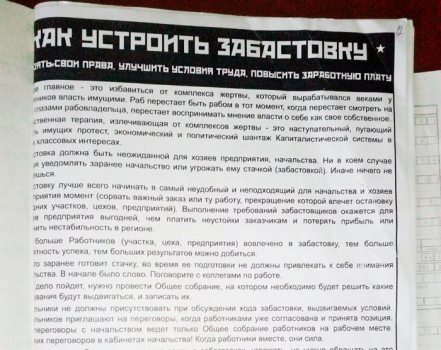New method: judge determines “extremism” by reading book titles
September 8, an activist of the anarchist movement Raman Khalilau was released after a ten-day. He told the Human Rights Centre "Viasna" how the judge defined the "extremist" content of the books, booklets and newspapers seized from him.
On August 29 Raman Khalilau came to the Savetski District Police Department on summons. The police had already drafted an administrative case against him under Article 17.11 of the Code of Administrative Offences "Production, distribution, and (or) storage of extremist materials". No expert examination was conducted in this case. "When my lawyer asked the police officer who led the case whether an expertise had been appointed, the latter replied that it would be decided by the court,” says the activist. According to him, the detention report was also prepared in advance: "The report had been completed by the time I came. The date of detention was indicated – August 29. In my opinion, they didn't even need my signature. I was just shown the paper. Only thanks to the insistence of my lawyer I wasn't detained before the trial.”
The administrative trial on Khalilau's case was conducted the same day at the Savetski District Court of Minsk. Having considered the case, Judge Artsiom Biaskishski ruled that the printed editions which were stored by the activist, were extremist. “Of all seized items, just one leaflet was attached to the case, whereas the titles of all other items were just enumerated in the report. Among them there were even books which have nothing to do with politics – books on history and so on. Their names were read out at the trial, and the judge ruled that all 92 items were extremist. They state that I stored them with the aim of distribution, and was sentenced to ten days of arrest for it,” stated Raman Khalilau.
"Art of War" by Sun Tzu [book is recognized as one of the best philosophical treatises on the art of ancient strategy, by the way - Ed.], "Social Anarchism vs. Anarchism as Lifestyle", brochure "NPP: Truth about Security. Anti-nuclear Resistance", magazine “Autonome”, leaflets “How to Make a Strike”, brochure “Strategic Aim of Anarchism”, newspaper “Nasha Prauda”, book “Chernobyl Lessons" – these are just a few names of the books, which were declared extremist by the judge. There was also a passage in the report “leaflets in the German language”. In fact, such statement is premature, and the activist doesn't need to take pride in it. “The definition of the notion of extremism is long and boring, but the judge should take time to study it,” concludes Pavel Sapelka after reviewing the ruling of Judge Biaskishski.
“Having issued the verdict on the administrative case against Khalilau, the judge apparently didn't know about the existence of the Law "On Counteraction to Extremism". First of all, the law provides a definition of extremism and extremist activity and, consequently, of extremist materials. Secondly, the law also defines the order of recognizing printed editions as extremist,” commented the lawyer.
“Just in case we should prompt that the aforementioned definition is contained in article 1 of the Law of the Republic of Belarus "On Counteraction to Extremism". The judge also needs to read Article 14 of this law, from which he can learn something new. Let me quote: "information products are deemed extremist by the court on the application of the public authority which counteracts extremism, at the location of the organization, which produced (produces) or distributes (distributed) them, or the place of residence of a citizen, who produced and (or) distributes (distributed) them, or on the territory of its discovery. The court's decision on the recognition of information products extremist, entered into force, is the reason for their destruction." This means that an offence can be recognized only in the case of an enforced court decision, by which the informational products were considered extremist.
"Not knowing this, the judge ruled from his own vision of the issue. It seemed to him that extremism are actions "aimed at destabilizing the social order and activities of organizations". There is no such definition in the law, as well as the notion of "violent offensive actions" which the judge saw in the printed editions. I also wonder what extremism the judge found in a sticker in German and whether he was able to translate it at all,” said Mr. Sapelka.
Perhaps, the young judge decided to earn a career bonus on the popular subject of extremism. However, the experienced lawyer believes that Artsiom Biaskishski shouldn't use the case of Khalilau to secure for himself the glory of pioneer in the application of Article 17.11 of the Code of Administrative Offences of the Republic of Belarus. "This, of course, is unacceptable. Firstly, there are clear violations of the national legislation and, secondly, we should consider the fact that the judge, after reading the titles of books and brochures and reading just one leaflet during the 20-minute hearing carried out censorship of all these publications. I don't think the judge needs such a fame,” summarized Mr. Sapelka.
Raman Khalilau will appeal the verdict of Artsiom Biaskishski at court. The activists insists that the judge groundlessly ignored his statement that he didn't intend to disseminate the editions stored by him. The activist also disagrees with the groundlessly severe penalty – ten days of arrest, and considers it as evidence of a biased attitude towards himself. He also reminds that in his ruling for the confiscation of the “subject of administrative offence” the judge did not enumerate the editions which were to be confiscated.
Pavel Sapelka believes that the court of appeal will make some “adjustments” to the verdict on the administrative case of Raman Khalilau.


















